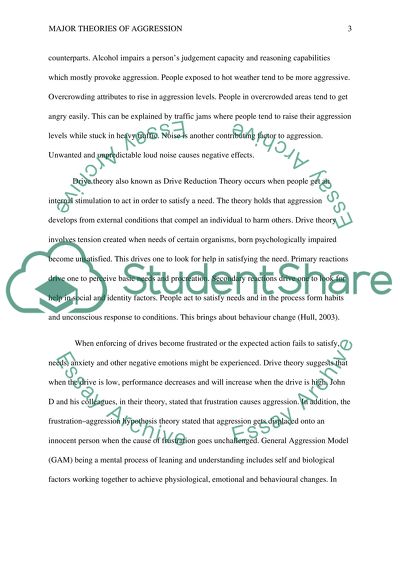Are you desperately looking for 'frustration aggression thesis'? All material can be found on this website.
When first formulated, the hypothesis stated that frustration always precedes aggression, and aggressiveness is the convinced consequence of defeat. Two years subsequent, however, Miller and Sears re-formulated the hypothesis to paint a picture that while defeat creates a demand to respond, both form of aggressiveness is one executable outcome.
Table of contents
- Frustration aggression thesis in 2021
- Frustration-aggression theory examples
- Frustration-aggression theory essay
- Frustration aggression theory psychology
- Frustration-aggression theory ppt
- Frustration aggression hypothesis def
- Frustration aggression hypothesis quizlet
- Frustration-aggression theory in sport
Frustration aggression thesis in 2021
 This image shows frustration aggression thesis.
This image shows frustration aggression thesis.
Frustration-aggression theory examples
 This image demonstrates Frustration-aggression theory examples.
This image demonstrates Frustration-aggression theory examples.
Frustration-aggression theory essay
 This picture shows Frustration-aggression theory essay.
This picture shows Frustration-aggression theory essay.
Frustration aggression theory psychology
 This image illustrates Frustration aggression theory psychology.
This image illustrates Frustration aggression theory psychology.
Frustration-aggression theory ppt
 This picture demonstrates Frustration-aggression theory ppt.
This picture demonstrates Frustration-aggression theory ppt.
Frustration aggression hypothesis def
 This picture demonstrates Frustration aggression hypothesis def.
This picture demonstrates Frustration aggression hypothesis def.
Frustration aggression hypothesis quizlet
 This picture shows Frustration aggression hypothesis quizlet.
This picture shows Frustration aggression hypothesis quizlet.
Frustration-aggression theory in sport
 This picture representes Frustration-aggression theory in sport.
This picture representes Frustration-aggression theory in sport.
Why do people become aggressive when they are frustrated?
If a goal is being blocked, people often become frustrated. If we're feeling very angry at the source of that frustration, we may become aggressive. The frustration-aggression theory states that frustration often leads to aggressive behavior. This theory was proposed by Dollard, Doob, Miller, Mower, and Sears in 1939.
How is displacement related to the frustration-aggression theory?
Displacement is a concept that closely relates to the frustration-aggression theory. Let's review. If a goal is being blocked, people often become frustrated. If we're feeling very angry at the source of that frustration, we may become aggressive. The frustration-aggression theory states that frustration often leads to aggressive behavior.
How is frustration-aggression hypothesis used in intergroup relations?
In the realm of intergroup relations, the frustration-aggression hypothesis was used to shed light on the dynamics of stereotyping, prejudice, and out-group hostility. The theory of scapegoating is probably the most well-known application of the frustration-aggression hypothesis to the study of prejudice.
Who is the founder of frustration aggression theory?
The Frustration-Aggression Theory, attributed to psychologist John Dollard, concept is also known at “Displacement Theory”, “Scapegoat Theory”, and “Kick The Dog Syndrome” (Morra, 2018). This theory states that there are six major beliefs that cause prejudice.
Last Update: Oct 2021